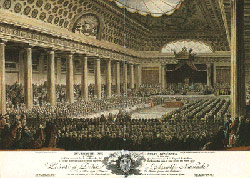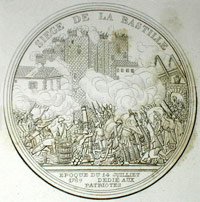Vollum 309
T, TH 9-10:20 am
Michael P. Breen
Vollum 235 (x7322)
T. 1:30-3 pm & W. 10-11:30 am or by appt.
Summary & Course Goals
"What is the goal toward which we are heading? The peaceful enjoyment of liberty and equality; the reign of that eternal justice whose laws have been inscribed, not in marble and stone, but in the hearts of all men, even in that of the slave who forgets them and in that of the tyrant who denies them."
– Maximilien Robespierre (1794)"I want Liberty and Equality to reign in Saint Domingue. I work to bring them into existence. Unite yourselves to us, brothers, and fight with us for the same cause."
– Toussaint Louverture (1793)
 For historians, few events are as central, or as problematic, as the French Revolution of 1789. From one perspective, the Revolution can be seen as the sudden, violent end of the ancien régime, a 1000 year-old political, social and cultural system. In the space of a few years, the revolutionaries replaced France’s absolute monarchy, first with a constitutional monarchy and then with a republic. They abolished the corporate, hierarchical society of the ancien régime, eliminating such distinctive features as the aristocracy, trade guilds, legal privileges and feudalism. Revolutionaries also attacked the central role of the Church, confiscating ecclesiastical property, instituting state supervision of the clergy and undertaking a large-scale program of de-Christianization. Finally, they collaborated with free people of color and slaves to challenge the dominance of the wealthy, white plantation owners who dominated France’s lucrative Caribbean colonies, setting in motion a chain of events that culminated with the creation of the first independent nation created by former African slaves—Haïti.
For historians, few events are as central, or as problematic, as the French Revolution of 1789. From one perspective, the Revolution can be seen as the sudden, violent end of the ancien régime, a 1000 year-old political, social and cultural system. In the space of a few years, the revolutionaries replaced France’s absolute monarchy, first with a constitutional monarchy and then with a republic. They abolished the corporate, hierarchical society of the ancien régime, eliminating such distinctive features as the aristocracy, trade guilds, legal privileges and feudalism. Revolutionaries also attacked the central role of the Church, confiscating ecclesiastical property, instituting state supervision of the clergy and undertaking a large-scale program of de-Christianization. Finally, they collaborated with free people of color and slaves to challenge the dominance of the wealthy, white plantation owners who dominated France’s lucrative Caribbean colonies, setting in motion a chain of events that culminated with the creation of the first independent nation created by former African slaves—Haïti.
 From another perspective, the French Revolution can be seen as the beginning of the modern world. Its struggles were to be replayed across Europe throughout the nineteenth and early twentieth centuries (with 1848 & 1917 being the most obvious examples). Revolutionaries’ arguments in favor of the abolition of slavery and racial equality echoed long after Napoleon restored slavery in France’s remaining colonies in the early nineteenth century. Modern concepts such as universal human rights, nationalism, mass democratic politics and even our understanding of “Revolution” as a historical process of social, political and cultural transformation can be traced to the events that unfolded in France at the end of the eighteenth century.
From another perspective, the French Revolution can be seen as the beginning of the modern world. Its struggles were to be replayed across Europe throughout the nineteenth and early twentieth centuries (with 1848 & 1917 being the most obvious examples). Revolutionaries’ arguments in favor of the abolition of slavery and racial equality echoed long after Napoleon restored slavery in France’s remaining colonies in the early nineteenth century. Modern concepts such as universal human rights, nationalism, mass democratic politics and even our understanding of “Revolution” as a historical process of social, political and cultural transformation can be traced to the events that unfolded in France at the end of the eighteenth century.
While historians generally agree on the Revolution’s historical importance, they differ widely when it comes to explaining its causes, its trajectory and its historical significance. For Marxist historians, the Revolution was the inevitable triumph of the bourgeoisie and capitalism over aristocracy and feudalism. Revisionist historians of the past thirty years have challenged this social interpretation of the Revolution, arguing that it should be seen, not as the product of inexorable historical forces, but as the result of a series of contingencies that led to the monarchy’s political collapse. The Revolution took shape, they argue, as new groups and new ideas rushed to fill the resulting vacuum. In the past decade or so, this revisionist model of a “revolution in political culture” has come under increasing scrutiny by historians who question the emphasis it places on intellectual and linguistic factors at the expense of relevant social realities and developments. Yet another group of historians, meanwhile, has started to emphasize the Revolution’s importance beyond Europe by re-integrating the history of Caribbean slave revolutions (especially the Haitian Revolution) into the larger history of the French Revolution.
This course, then, will be an examination of both the French Revolution as a historical event and the various ways historians have interpreted and debated its causes, course and significance. Consequently, this class has several main goals. By the end of the semester, students should have developed:
 A familiarity with the historical events, figures, ideas and forces that caused the French Revolution and helped to shape its ultimate course, with a particular sensitivity to the historical connections (or lack thereof) between the fall of the Old Regime and the subsequent course of the Revolution.
A familiarity with the historical events, figures, ideas and forces that caused the French Revolution and helped to shape its ultimate course, with a particular sensitivity to the historical connections (or lack thereof) between the fall of the Old Regime and the subsequent course of the Revolution.- An understanding of different historical interpretations—Marxist, Revisionist & Post-Revisionist—of the Revolution, as well as the ability to critically evaluate these interpretations.
- The ability to develop their own arguments in response to some of the central issues facing all historians of the French Revolution. These include:
- Was the Revolution primarily a social, political or cultural event?
- Was the period from 1789-99 primarily a “bourgeois” Revolution? If so, how should we define the term “bourgeois”? If not, which social groups (if any) were responsible for the Revolution?
- What were the fundamental issues and problems facing the Revolutionaries?
- What was the relationship between the Revolutionaries and the rest of French society, including women, the peasantry and the urban popular classes?
- What was the connection between the liberal (1789) and radical (1793) Revolutions? Was the Terror a historical accident or the inevitable outcome of 1789?
- What role did events in France play in fostering uprisings by free people of color and slaves against colonial regimes in the Caribbean?
- What explains the initial successes of the movement for racial equality and emancipation in France’s colonies, and its ultimate failure in Guadeloupe (where slavery was restored) and Saint-Domingue (which only preserved emancipation by winning its independence).
Readings
The following books are available at the bookstore and on reserve at the library:
- Baker, Keith Michael, ed., The Old Regime & the French Revolution (Chicago)
- Brown, Howard G., Ending the French Revolution: Violence, Justice, & Repression from the Terror to Napoleon (Virginia)
- Darnton, Robert, The Forbidden Best-Sellers of Pre-Revolutionary France (Norton)
- Desan, Suzanne, The Family on Trial in Revolutionary France (California)
- Doyle, William, The Oxford History of the French Revolution, 2nd ed. (Oxford)
- Dubois, Laurent, A Colony of Citizens: Revolution and Slave Emancipation in the French Caribbean, 1787-1804 (North Carolina)
- Dubois, Laurent, Avengers of the New World: The Story of the Haitian Revolution (Belknap) [recommended]
- Dubois, Laurent & John D. Garrigus, Slave Revolution in Caribbean, 1789-1804: A Brief History with Documents (Bedford/St. Martins)
- Jordan, David, The King’s Trial: Louis XVI vs the French Revolution (California)
- Kates, Gary, ed., The French Revolution: Recent Debates & New Controversies, 2nd ed. (Routledge)
- Sewell, William H., Jr., A Rhetoric of Bourgeois Revolution: Abbé Siéyes & “What is the Third Estate” (Duke)
- Storey, William Kelleher, Writing History: A Guide for Students (Oxford) [recommended]
- Tackett, Timothy, When the King Took Flight (Harvard)
N.B.: Additional required readings (marked with an [E]) are available on e-reserves. A handful of other readings are on 2-hr reserve at the library. These are indicated on the syllabus.
Required Assignments
Conference: Regular conference attendance and participation is expected. It goes without saying that you are expected to come to conference having done the reading for that day and prepared with questions, observations and/or ideas to discuss.
Whether for illness or for other reasons, if you must miss a conference, please try to let me know in advance.
First essay (due Fri. Sept. 24th @ 5pm): A five-page essay on a topic to be distributed in advance. No additional reading or research will be required.
Second essay (due Mon. Oct. 25th @ 12 noon): A five-to-seven page essay on a topic to be distributed in advance. No additional reading or research will be required.
Papers #1 & #2 should be submitted via e-mail attachment (Word Format)
Final essay (due Tues. Dec. 14th @ 5pm): A 12-15 pg. research essay on a topic to be chosen in consultation with me.
The Fine Print: Extensions may be granted at my discretion, but never on the day a paper is due (except in the case of serious emergencies). If you need additional time, you must contact me more than 24 hours before the paper is due, provide a reasonable explanation for your request and an alternate due date. I reserve the right to refuse any extension, so just getting in touch with me does not in itself guarantee one. I write fewer comments on late papers and will consider the extra time an advantage, so expectations will be raised accordingly.